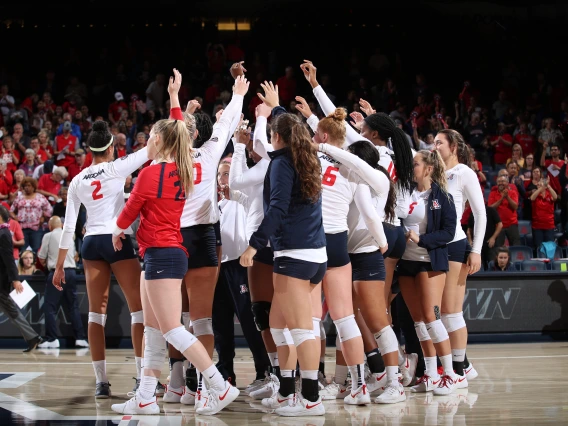
UA volleyball team studying intercultural competence on a four-country trip to Europe
On the University of Arizona volleyball team’s upcoming European tour, the student-athletes will be enrolled in a study abroad class, adding an educational and cultural component to their competition schedule.
The novel approach of combining a for-credit class with NCAA-sanctioned international competition comes from a partnership between C.A.T.S. Academics, UA Study Abroad and the College of Humanities.
The volleyball team, which is embarking this week on a four-country European tour, is the second UA team to have an instructor embedded on an international competition trip. In a pilot program, the women’s tennis team earned study abroad credit last summer while in Japan.

The program came out of conversations between Harmony DeFazio, executive director of UA Study Abroad, Associate Athletic Director John C. Mosbach, who is also the director of C.A.T.S. Academics, and Judd Ruggill, head of the Department of Public and Applied Humanities. The student-athlete population can be difficult to serve in terms of study abroad opportunities, DeFazio says, but NCAA rules allow for a team to take an international trip once every four years.
“We figured out that when they’re doing their team travel, we can potentially layer on a course that would contextualize a bit where they are going,” DeFazio says. “We wanted to do a credit-bearing course, and we wanted it to be something that would help put the international experience into perspective.”
The course, Public and Applied Humanities 372: Intercultural Competence: Culture, Identity, Adaptation, and Intercultural Relations, serves the educational goal of helping students develop their cultural cross-cultural understanding, empathy and collaboration in a global context.
“An essential part of working at the UA is pursuing innovative ways of enriching the student experience,” Ruggill says. “PAH 372 was designed expressly with this in mind, and coupling the course with the student-athlete experience abroad has been a great match all around.”
The demanding schedule and rules for NCAA athletes creates a challenge in finding opportunities for those student-athletes to have study abroad experiences, Mosbach says. The teams spend so much time together, an approach focused on groups in addition to efforts to engage individual students made sense.
“We’re committed to the total success of our student-athletes, and this is the perfect framework,” he says. “This is a great collaboration to add an academic piece to the international competition. It’s tied into their education, and at the end of the trip, it brings substantial value to their experience.”
For Head Coach Dave Rubio, this is the first time in his 28 years at the UA he’s been able to take a team on an overseas trip. The itinerary includes Italy, Slovenia, Austria and the Czech Republic.
“The benefits of a trip like this are numerous and far-reaching. Volleyball, to me, is a secondary component of the trip. The wins and losses of the matches will be insignificant to the overall experience,” Rubio says. “For a lot of the players, this is the first time they’ll ever venture outside of the U.S. The educational aspect of it may be the thing they’ll enjoy the most.”
Before the trip, the players were split into groups. Each group was tasked with researching the history and culture of one of the cities they’ll be visiting, then giving presentations to the rest of the team.
Markéta Hanzlová, who was born in Liberec, Czech Republic, will be one of the local guides for the players. Hanzlová played for the Wildcats in 2010 and 2011 while obtaining a degree in German studies.
“When I was 25 I traveled around the world, and that was mind-blowing for me. It changed my entire perspective of how I viewed the world,” Hanzlová says. “I had my degree in hand, yet without question, the best education I had was experiencing different cultures. Those are the things you can’t learn in a classroom. That will be very similar to what the players will experience.”
While various schools include service programs on foreign athletic trips, including a for-credit academic component is rare.
“We’re very lucky in that we have such good partners in Arizona Athletics and the College of Humanities. They have been very willing to help us figure out this program,” DeFazio says. “They fully understand the value of international experiences and are excited to help students gain a leg up in the career world after college.”
PAH 372, one of the core classes in the applied humanities major, can be modified to match the particular cultural experiences students will encounter, making it a good fit for wherever teams might be traveling in future years.
“This course is able to give students the tools to talk about what it’s like to have an international experience,” DeFazio says. “They’re traveling to compete, but the intercultural competence course is a perfect fit while they’re navigating being in other countries. Our hope is there are enough teams that every year someone is traveling, and we’ll be able to continue this trend."

